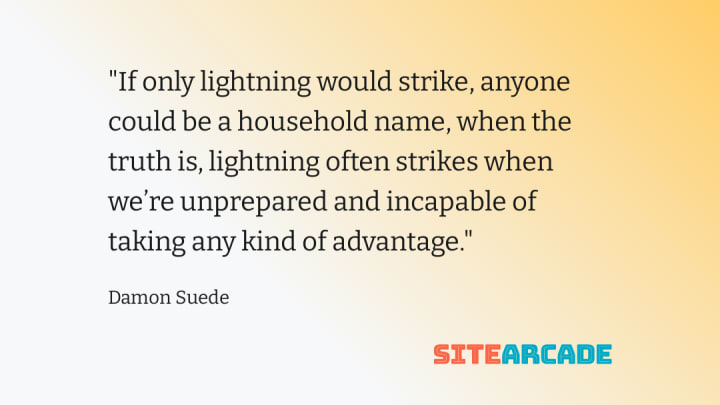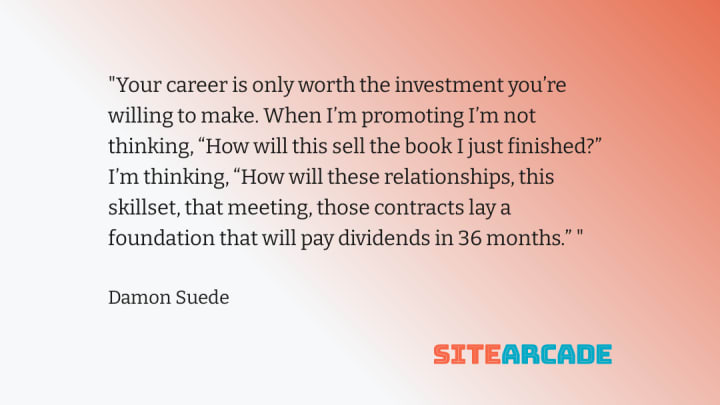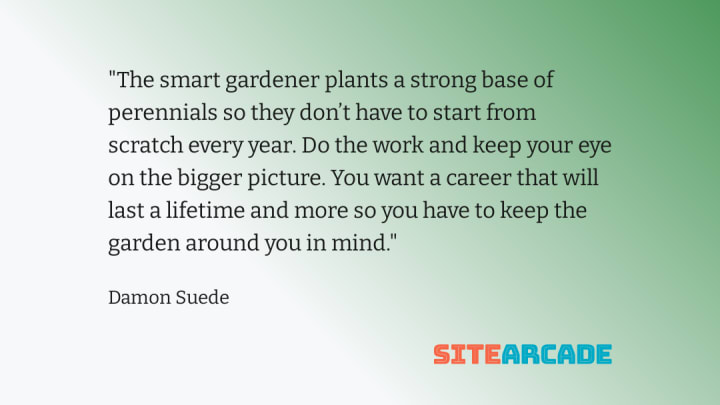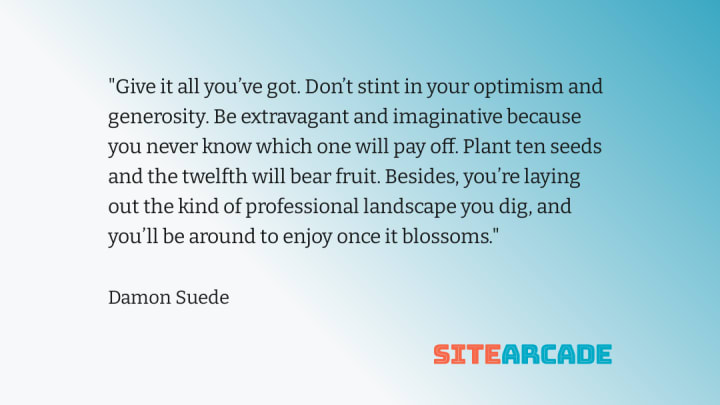Growing a Writing Career by Skipping Shortcuts
Raise your hand if you’ve ever wondered if there’s a secret code, E-Z solution, or quick fix for the challenges you face as a professional writer. Yeah, ditto. Since we are each the protagonist of our own story, we assume that rules and work and steps are for all the “other” less-fortunate suckers playing secondary roles as we ascend swiftly to stardom.
You see this kind of gimme-gimme thinking a lot in get-rich-quick writing guides: the hidden romance formula, the surefire success kit, or the miracle bestseller system which can turn you into the lovechild of J.K. Rowling and Stephen King… In this conjob, hard work is for the diligent rubes, but you are just so darn special your book is brilliant from the get-go and your name will be picked out in starlight for eternity. Anyone can be a bestseller. Everyone is a genius. All books are great.
Sucker bait, all of it.
My family was in the jewelry business, and my mom always said, “leave fool’s gold for fools.” At the root of every swindle, grift, or scam in the world lie ferocious laziness and greed… the craven certainty that you can have something for nothing and that cutting corners will get you somewhere faster. What’s bizarre is, all our experience, evidence, and history proves how wrongheaded that approach is. In a business as insular as genre publishing, burning bridges and trampling your colleagues will do you few favors.

We all do it, of course…nursing the poisonous belief that somehow WE are special, WE can cut in line, WE know better than everyone else, WE deserve a break. If only lightning would strike, anyone could be a household name, when the truth is, lightning often strikes when we’re unprepared and incapable of taking any kind of advantage.
The Myth of Overnight Writing Success
As New Yorkers always say, “It takes ten years to become an overnight success.”
My friends in showbiz used to laugh at shows like American Idol and X-Factor because of the way they misrepresent auditions. A group of talentless punters line up begging for judges to “make” them a star makes exactly NO sense. American Idol didn’t make Carrie Underwood or Kelly Clarkson stars; those ladies were already going to be stars; they were talented and smart and driven and professional and they both exploited American Idol, which exploited them right back. Mutual benefit, mutual exploitation. Anyone who achieves real stardom has invested in the process in ways few will ever understand.
What we want is a free ride, a fast forward for our careers, a way to skip all the unfun, unlovable, uninspiring things that make art into a career. We want the garden, but we want to skip the weeds and seeds.
Success, real success, comes from years of backbreaking, mindboggling, heart-stopping labor through crushing choices and inadvertent calamities. Even lucky people must be capable of taking advantage of good fortune. As Mark Twain put it, “Luck is opportunity plus preparation.” You have goals, hopefully specific, relevant, and achievable goals that drive your professional decisions, but what have you done today to advance them?
No one grows an oak tree in an afternoon.
Of course, there’s no one way to be a success. Each of us walks a different path, with skills, books, histories, and talents that are (at best) adjacent to our peers’. Authors spend their lives gearing up for a journey headed for the horizon. When we take classes, read critics, network with colleagues, volunteer for chapters, we’re laying bricks in a road we’ll be able to walk when the way opens before us.
The Myth of the Miraculous Book Promo
How do you eat an elephant? One bite at a time.
While slow, steady accretion may not sound sexy, every stable career grows from a base of time-tested relationships and authentic experience. You develop your craft and your voice, one book, one sentence, one word at a time. All promo, even the flashy stuff, works best with a clear context, extraordinary value, and an emotional experience that people can rely on. You have to plant the seeds wherever you find fertile ground.
That’s simply logical: publishers want to work with positive professionals who understand the business and their role in it. Agents wants to rep creative folks who can hit targets and expand their audience. Fans return to authors who can deliver the feelings they expect in ways that exceed expectation.
Marketing maven Seth Godin says “The best time to start promoting your book is three years before it comes out.” Great advice! What will you need to promote the books you’ll be writing in three years? How can you lay those tracks now? What skills, resources and allies should you be gathering so that they’re on hand when the time comes, because it will come.
Think of it another way, what assets and access do you wish you had available right now, and when could you have gotten those sorted?
I’m as impatient as anyone you’ve ever met. Most of the reason I plan promo so assiduously is because my impatience goes thermonuclear when I get in my own way via sloppiness or inattention. Your career is only worth the investment you’re willing to make. When I’m promoting I’m not thinking, “How will this sell the book I just finished?” I’m thinking, “How will these relationships, this skillset, that meeting, those contracts lay a foundation that will pay dividends in 36 months.”
Baby steps, baby steps.

Almost every author I talk with worries that promo work drains and derails them, and yet we all know how essential it is in a world in which 75,000 books are published every year and 58% of the population will never read another book after finishing school. The thing is, if you take the promo in small, steady steps not only will the payoff be greater, it’s less likely to exhaust or depress you. One rung at a time may not sound glamorous, but it’s your best shot at the next level.
Planting Your Writing Career Seeds
When I first moved to New York, I was green and 16. By great good fortune I got cast in a show with a bunch of grizzled old-timers who took me under their sequined wings and peppered me with superlative advice. Every one of them urged me to take my time and build a career one brick at a time, like a fortress strong enough to withstand the elements. The assured me that rushing and shortcuts would only bring me to grief, but if every day I did one thing, just one, for my career, it would grow strong and steady towards the light.
So now I’m going to play the part of the grizzled old salt: every day do one thing that advances your craft, your career, or your genre: a note, a phone call, a meeting, a few hours volunteering, a benefit, a favor, or a schlep. Scatter seeds in all directions never knowing which will sprout, but confident you’re contributing to the health of the industry and your career. Every day, do one thing to tend your professional landscape and help it flourish.
Since each of these actions is only one thing, your daily “seed” doesn’t have to take up loads of time, but you’ll need a new one every day. Make a list; I love lists!
- Prioritize by deadlines, projects, and possibilities.
- Reach out to other writers and pros at your level to facilitate cooperation.
- Try to develop new readers rather than poaching existing fans of other authors.
- Focus on smaller, accessible favors rather than grandiose longshot nonsense. As my theatrical mentors would often say, no one person is powerful enough to start or stop your career.
The smart gardener plants a strong base of perennials so they don’t have to start from scratch every year. Do the work and keep your eye on the bigger picture. You want a career that will last a lifetime and more so you have to keep the garden around you in mind.

Cultivate your Genre and Your Community
Landscaping your professional terrain isn’t all about you-you-you. Promo can (and should) be unselfish, because the best promo is positive word of mouth; integrity, kindness, and diligence build a lot of good will in every community. If you improve the ecosystem, folks will notice and spread the word.
Your promo seeds don’t have to directly and immediately benefit you, but you should be able to explain the ways they could grow over the next three years. Best part? In three years, that investment will start to pay regular dividends.
So boost talented colleagues, navigate sticky situations, avoid toxicity, shrug off leeches and naysayers. Diversify your career investment portfolio. Mix it up when you can so that you don’t lean too heavily on one strategy or corner of your career. Ask yourself:
- What would you like to be doing in three years and how can you set the stage now?
- What groups, events, and venues can you assist given your unique skills?
- Where can you find nonreaders with the potential to become genre fans?
- How can you help bloggers, book clubs, and journalists who might get overlooked by bigger fish?
- What incremental tasks would help you anchor your brand and platform for the long game?
- Who deserves some extra help from your professional quarter?
Of course, the magic of working this way is that once you gain a reputation for being positive, dependable, and capable you attract other folks with the same qualifications. Without realizing it, you build the career you want and deserve. Bit by bit, people you revere become co-conspirators in your success. Working from gratitude, generosity, and abundance encourages cooperation and collaboration.
Give it all you’ve got. Don’t stint in your optimism and generosity. Be extravagant and imaginative because you never know which one will pay off. Plant ten seeds and the twelfth will bear fruit. Besides, you’re laying out the kind of professional landscape you dig, and you’ll be around to enjoy once it blossoms.
One thing, every day. You’ll thank yourself when they sprout.
